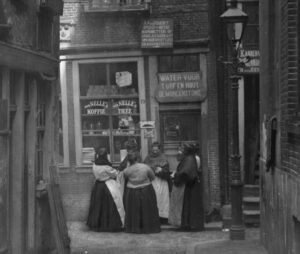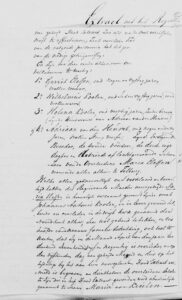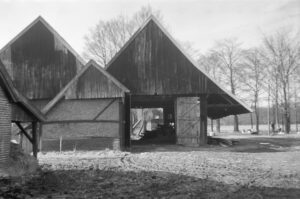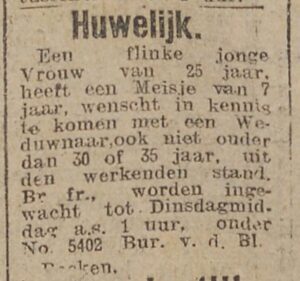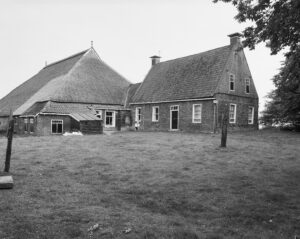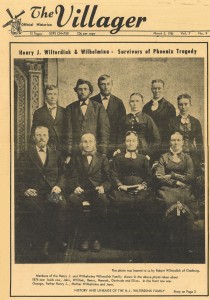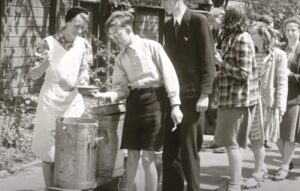A water-en-vuur-winkel (literally: water and fire shop) was a shop where you could buy buckets of hot water and hot coals to get your own fire started. Water-en-vuur-winkels were mainly found in larger cities. … [Read more...]
Case study: incorrectly recorded burial of Maria Elissen
My ancestor Maria Elissen was the wife of Johannes Antonij Koolen. I knew she must have died between 1789, when her youngest child was born, and 24 December 1798, when her husband was called a widower when he died.1 The burial register for Tilburg for this period is indexed and appears to be complete. However, no burial was found for Maria Elissen.2 The only burial for a Maria, wife of Jan Koolen was Maria van Keulen, who was buried on 15 April 1795, the wife of Jan Koolen.3 Could this have … [Read more...]
Dutch term – Vruchtgebruik
Vruchtgebruik (literally: use of the fruits) is the Dutch term for usufruct, the right to use a property, usually for the remainder of one's life. You may encounter the term in notarial records, for example in wills that give someone the vruchtgebruik of a property that is then left to someone else after they die, or in a sale record where the vruchtgebruiker (person who has the right of vruchtgebruik) relinquishes their rights. You may also find the term in death duties files, which would … [Read more...]
Dutch term – Schuur
A schuur is a barn or a shed. Some of my ancestors lived at the Roerdink farm in the Netherlands from the 1400s to the 1600s. The farm still exists. The main building has been renewed but some of the outbuildings have not. They used tree ring dating on the barn a couple of years ago and it was from 1544 so it was built when my ancestors lived there. It is the oldest known barn in the Netherlands. Cultural Heritage Service (CC-BY-SA). … [Read more...]
Dutch term – Leeftijd
The leeftijd is the age. You may find a person's age mentioned in birth records (father, informant, witnesses), marriage records (bride and groom, witnesses), death records (deceased, informant, witnesses), census records, and also in some court or notarial records, especially when people testify about something. As you go back further in time, there will be fewer records that give a person's age. Keep in mind that illiterate people are less likely to know their own age. An age that ends in 0 … [Read more...]
Dutch term – Contactadvertentie
A contactadvertentie is a contact ad, an advertisement by a person looking for a spouse. The ads are almost always anonymous, but give you some idea what people found important in a spouse. Example This ad from the Rotterdamsch Nieuwsblad [Rotterdam Newspaper] of 14 January 1913 shows one woman using an ad to find a spouse. Marriage A capable young woman age 25, with a girl age 7, wishes to make her acquaintance with a widower, no older than 30 or 35, from the working class. Letters … [Read more...]
Dutch term – Kop-hals-rompboerderij
A kop-hals-rompboerderij (literally: head-neck-torso farm) is a type of farm. The living area formed the head of the farm, where the farmer's family would have lived. A narrow corridor (the neck), sometimes with bedsteads for staff, connected the living area to the stables where the animals were housed (the torso). It is a type of farm mainly found in the northern provinces of Friesland and Groningen. … [Read more...]
Dutch term – Broer, broeder
A broer or broeder (old spelling) is a brother. A half-brother is a halfbroer or broeder van halven bedde (brother of half a bed; old term). See the chart for other Dutch terms for relationships. … [Read more...]
Dutch term – Royement
A royement can have multiple meanings, all having to do with cancellation or ceasing to be valid. When referring to persons, it is a disbarment or revoking of membership. When referring to records, it means the record itself is cancelled, for example when a mortgage is paid. You may come across the term in contemporary summaries of notarial records. Royementen of mortgages were typically created and handed to the interested party, rather than also being copied into the notaries' minutes. The … [Read more...]
